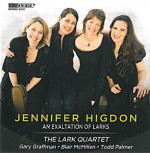Column Name
Title
Jennifer Higdon: An Exaltation of Larks (The Lark Quartet, Gary Graffman, Blair McMillen, Todd Palmer). Bridge 9379
Body
According to the League of American Orchestras, Jennifer Higdon is one of the country’s most-performed composers, and this engaging sampler of her chamber music reveals why. Higdon (who won a 2010 Pulitzer Prize for her Violin Concerto) wrote this recording’s title track in 2005, imagining, as she put it, “thousands of birds flying and singing wildly, with extraordinary energy and intensity.” Here the quartet’s vivid playing dovetails sweetly with this image. Higdon’s swiftly moving lines—evocative of a flock of swallows in aerodynamic unison on a crisp fall day—show off the quartet’s attention to phrasing as well as its luxurious tone.
Pianist Gary Graffman joins the foursome for Scenes From the Poet’s Dreams (1999, for piano left-hand and string quartet), starting with “Racing Through Stars,” in which the players travel through all 12 major keys. “Summer Shimmers Across the Glass of Green Ponds” ends with a beautiful sequence that evokes the slow movement of Tchaikovsky’s Serenade for Strings, followed by the nervous “I Saw the Electric Insects Coming,” with a brief episode as a tribute to composer George Crumb. “In the Blue Fields They Sing” gives the group a glowing, heavenly chorale and Higdon ends with “The Fast Dancers Dance Faster,” as Graffman joins with each of the players, in turn, in a sizzling race to the finish.
For Light Refracted, Higdon used some of the timbres and rhythms of her own blue cathedral (1999) and adds piano (Blair McMillen, M.M. ’95) and clarinet (Todd Palmer) to a string trio in two parts: the first, “Inward,” should satisfy listeners seeking recently penned harmonic consonance; the second, the jittery “Outward,” ends the disc with high-energy rhythmic bite.
Violinist Deborah Buck (B.M. ’93) leads the Lark Quartet, with cellist and Pre-College faculty member Caroline Stinson (M.M. ’08, Artist Diploma ’10) providing a resonant anchor. Their excellent colleagues, Basia Danilow (violin) and Kathryn Lockwood (viola), complete the roster. And it’s hard not to be struck by the superb aural quality of the disc, engineered by Silas Brown, which was recorded in the American Academy of Arts and Letters.
counter)induction: {group theory}. New Dynamic Records (Indiana University Southeast). (no catalog number)
 If nothing else, this recent disc by the new-music ensemble counter)induction contains the month’s best title: Dead Cat Bounce, a bit of Wall Street jargon that refers to a stock briefly recovering after a precipitous fall: “Even a dead cat will bounce if dropped from a great enough height.” Here, composer Eric Moe concocted a string of surprises when he wrote this slice of perpetual motion in 2008 for the ensemble. The playful finale of the album, it showcases the musicians’ jumpy energy and deadpan wit.
If nothing else, this recent disc by the new-music ensemble counter)induction contains the month’s best title: Dead Cat Bounce, a bit of Wall Street jargon that refers to a stock briefly recovering after a precipitous fall: “Even a dead cat will bounce if dropped from a great enough height.” Here, composer Eric Moe concocted a string of surprises when he wrote this slice of perpetual motion in 2008 for the ensemble. The playful finale of the album, it showcases the musicians’ jumpy energy and deadpan wit.
A strange multiple personality emerges in Salvatore Sciarrino’s Centauro Marino (1984), based on the mythological creature that is half-man and half-horse, here with a fish tail. The ensemble includes violinist Miranda Cuckson (Pre-College ’90; B.M. ’94, M.M. ’01, D.M.A. ’06), violist Jessica Meyer (B.M. ’96, M.M. ’98), cellist Sumire Kudo (Artist Diploma ’03), and clarinetist Benjamin Fingland (B.M. ’97, M.M. ’99, and also Meyer’s husband). They breathe life into quiet, wiry harmonics and feathery gestures at the upper end of their registers, while pianist Steven Beck (B.M. ’01, M.M. ’03) parries with barbaric lunges. Beck’s rumbling piano figure forms the spine of Kyle Bartlett’s Bas Relief (2007), also for quintet. Though the first section barrels along nonstop, in the quiet second part, Beck and the superb Fingland have the stage to themselves.
In Douglas Boyce’s Deixo/Sonata (2009) for viola and piano, the composer was inspired by a soggetto cavato, a technique for crafting musical cryptograms that was first used by Renaissance composer Josquin des Prez, to create a musical transliteration of Meyer’s name. In three sections, the piece mixes angular outbursts and sly glissandos for the viola, set against Beck’s glittering keyboard backdrop. The finale, “An Agile Clockwork,” zooms along until it arrives at an unexpectedly quiet conclusion.
Flutist Alex Sopp (B.M. ’05, M.M. ’07) joins the group for Lee Hyla’s Ciao, Manhattan (1990), a wistful daydream for flutes, viola, cello, and piano, which opens the recording. And Matthew Gold (’98, percussion) adds his expertise to Erich Stem’s Fleeting Thoughts (2010), a work as engaging—and brief—as its title implies.
Composer Ryan Streber (B.M. ’01, M.M. ’03) wrote Partita (2007) for Kudo, giving her a virtuosic study that shows off both the range of her technique and her instrument’s luminous tone. (The multitalented Streber also engineered this detailed recording, at Oktaven Audio in Yonkers.)
On a visual note, a vibrant plus is the album’s graphic design, with the disc, cover, and liner notes using mandalas created by Philip Collins at the Indiana University Southeast Design Center.





